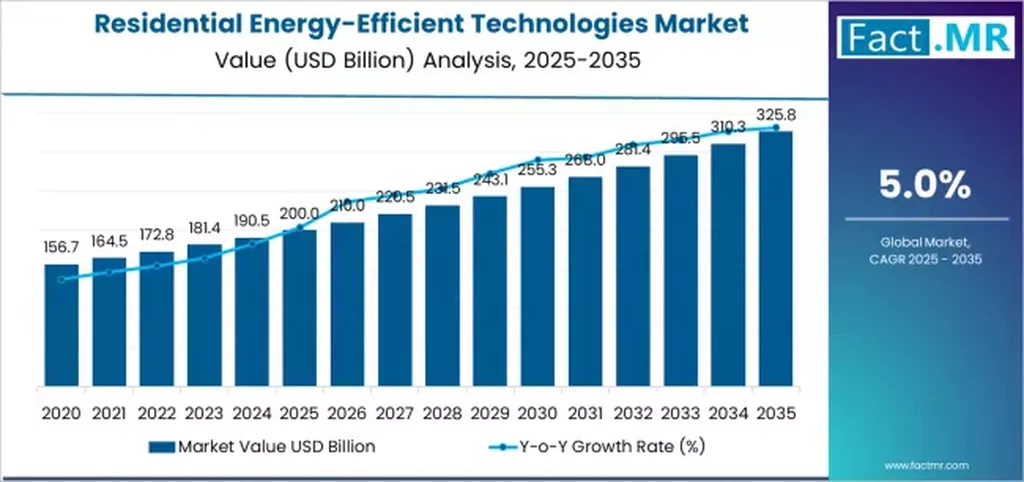The global residential energy-efficient technologies market is on a trajectory to nearly double in size by 2035, expanding from USD 200.0 billion in 2025 to USD 325.8 billion. This growth, projected at a compound annual growth rate (CAGR) of 5.0%, is driven by a confluence of factors that are reshaping how we build and live in our homes.
At the heart of this transformation is a growing recognition of the urgent need to reduce energy consumption and carbon footprints. Rising energy costs and increasingly stringent environmental regulations are compelling homeowners and developers to prioritize energy-efficient solutions. Technologies such as high-efficiency HVAC systems, advanced insulation materials, energy-efficient windows, smart lighting, and intelligent home energy management systems are witnessing robust adoption. These innovations are not just about cutting costs; they are about redefining the very essence of sustainable living.
Smart home integration is a key growth driver, as energy-efficient solutions are increasingly embedded within connected home ecosystems. Devices capable of monitoring real-time energy usage, automated climate control, and adaptive lighting management enhance convenience and deliver measurable energy savings. The expansion of renewable energy adoption, including rooftop solar systems paired with residential storage solutions, is reinforcing the shift toward energy-efficient living, enabling households to achieve self-sufficiency and reduce reliance on grid power.
Regionally, North America and Europe are anticipated to lead the market due to well-established residential construction standards, government incentives, and consumer readiness to invest in high-performance energy-efficient solutions. Asia-Pacific, particularly China and India, presents high-growth potential driven by rapid urbanization, increased disposable incomes, and supportive government initiatives promoting energy efficiency in residential projects. Latin America and the Middle East & Africa are gradually emerging as important markets as infrastructure development and smart city projects accelerate the demand for sustainable residential technologies.
The market landscape is expected to witness significant innovation and competitive activity. Companies are investing in research and development to introduce cost-effective, durable, and easy-to-install energy-efficient solutions tailored to regional climate conditions and consumer preferences. Strategic collaborations between technology providers, utilities, and construction firms are likely to enhance product adoption and integration across large-scale residential projects.
By 2035, the residential energy-efficient technologies market is projected to evolve into a highly integrated ecosystem where smart automation, renewable energy integration, and advanced efficiency solutions converge to support energy sustainability, cost reduction, and improved occupant comfort. This evolution underscores the long-term potential of the market to redefine energy consumption patterns across global residential segments.
The heat pumps technology type segment is projected to maintain its leading position in the residential energy-efficient technologies market in 2025 with a 40.0% market share, reaffirming its role as the preferred technology for comprehensive energy efficiency and building climate control operations. Building owners and energy managers increasingly utilize heat pumps for their superior energy efficiency capabilities, excellent performance characteristics, and proven effectiveness in heating and cooling applications across various building types while maintaining operational efficiency and sustainability standards.
As the market expands, it is clear that the future of residential construction lies in the integration of smart, sustainable technologies. The challenge for industry professionals is to scale these innovations globally, balancing economic imperatives with the urgent need to mitigate climate change. The construction sector is poised to lead a green revolution—one that has the potential to reshape our cities, our economies, and our lives.

